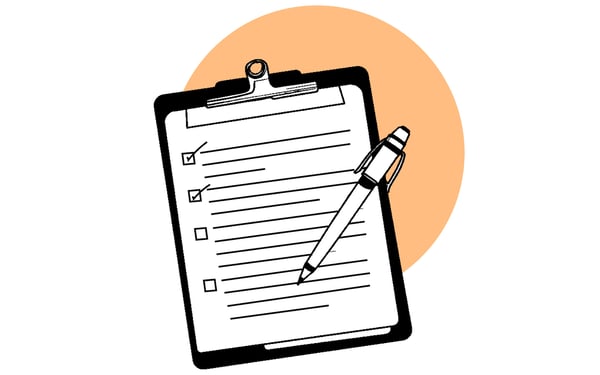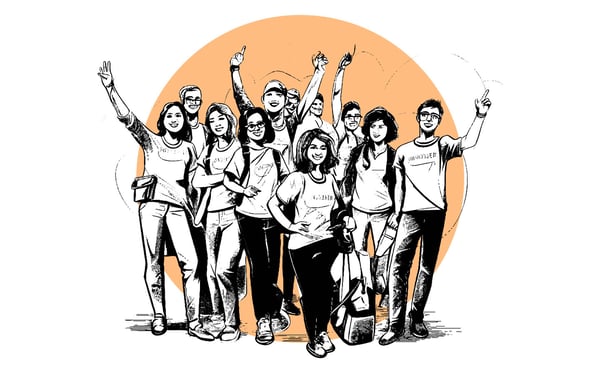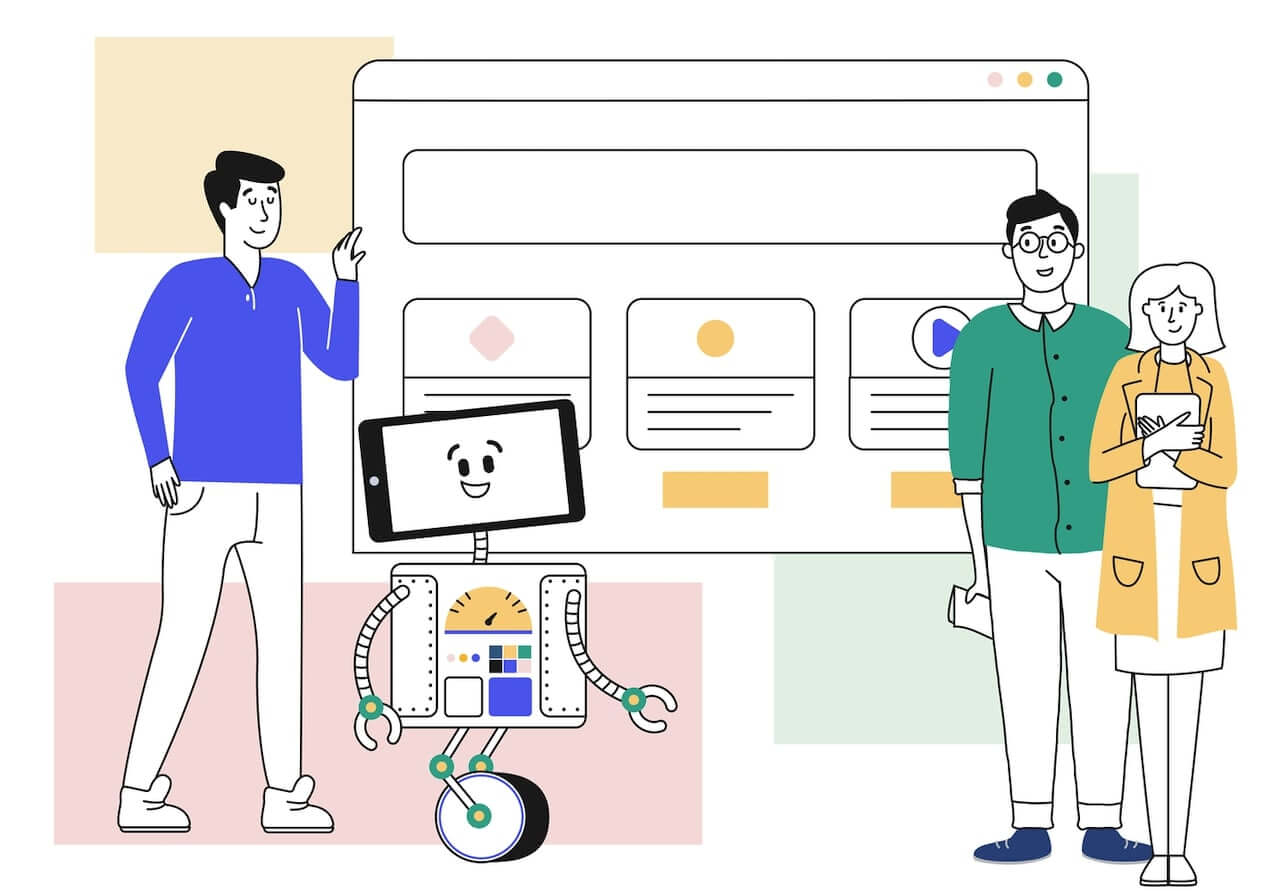In this article, we're going to be talking about COVID and beyond. And, the implications of the pandemic for marketers. We will look at various scenarios and how we're interpreting data and using it to plan our marketing for ourselves, and also our advice and recommendations and strategies for others.
First, a brief note about monoliths
%20(1).jpg?width=680&name=Untitled%20(20)%20(1).jpg)
There has been a sudden emergence around the world - a modern-day phenomenon - of monoliths appearing in the middle of nowhere. It is, in a tiny way, emblematic of how suddenly things can emerge and change everything. Then, perhaps, disappear.
With that thought in mind, let's start with a couple of cautions. First of all, a wise man once said, 'Never make predictions, especially about the future.'
There's nothing like a prediction that turned out wrong to ruin your reputation. So, we're talking about scenario modelling and scenario planning here, and your mileage may vary and we might be wrong. That's our first government health warning!
The second health warning here, and this is attributable - General Eisenhower said this - 'Planning is essential, but plans are irrelevant.'
When you're dealing with something as unpredictable as a pandemic, you can't make a roadmap for it, you can't guarantee anything and you can't control the outcomes, so you have to plan for different scenarios.
Where are we now? Where are we going?
%20(1).jpg?width=680&name=Untitled%20(21)%20(1).jpg)
There is a lot of good news, in fact. We saw vaccines being developed at record speed, within months rather than years. It's astonishing. Now, of course, we have challenges around delivery, around people's willingness to be vaccinated, around manufacturing. There's the sheer scale of delivery to account for, not to mention distribution in third world countries. So, the pandemic is not solved by having a vaccine. It's solved by getting the vaccine to people.
Another bit of good news is there are better treatments coming and we've learned so much already about how to help people who do contract COVID, such as steroids and other medications.
It's notable that some countries had better outcomes. 'Viruses come from nature, but pandemics are caused by people.' It's a people thing. It's a politics thing. If you are willing to accept trade-offs like they have in New Zealand or Singapore, you can have a significant impact on the virus, even without vaccines and even without treatments.
Even in the UK - not known world-wide for its strategies in tackling this thing - there has been a huge increase in our ability to test and trace the virus. There are new technologies like DNAnudge that are going to be more accurate, faster, and cheaper testing methods.
%20(1)-3-1.jpg?width=680&name=Untitled%20(22)%20(1)-3-1.jpg)
In the next few months, we're going to see the majority in the UK of the most vulnerable people get vaccine shots. That will reduce the fear of the disease quite significantly. It won't necessarily stop transmission, but it should have a significant impact in time because death rates are a lagging indicator. Let's call that 'the end of fear'.
By Q4 of 2021 we'll see the end of the pandemic, meaning herd immunity; meaning we are able to go back to something that looks like normal life. But, warning: there is no 'back to normal' and there is no permanent new normal. Rather, our definition of 'normal' will keep evolving. We have to adapt and change with it.
From 2022, we get into a scenario that you might label 'vaccine plus', and this is where the the virus is still in circulation, but the combination of effective treatments, vaccination, and herd immunity reduce its impact in the UK and other developed countries. But, there's probably still masks and distancing and a little bit of travel disruption and uncertainty.
Almost certainly, there is going to have to have re-vaccination and booster shots. It's a known unknown how long the immunity or the impact of vaccines last. Another known unknown is how these new variants will impact things.
Who are the winners and losers?
%20(1).jpg?width=680&name=Untitled%20(23)%20(1).jpg)
Have you spent the last year 'doomscrolling'? A runner-up for Word of the Year, surely. This is the act of trying to understand what is happening with this pandemic - what the impacts might be - through the medium of scrolling through news and social media feeds.
It has emerged from our doomscrolling activities, that the winners and losers are pretty clear. 'The recovery will be digital', as McKinsey have said.
We are in a period of compressed change and, yes, some of that change will be temporary. Clearly, if and when we're all allowed to go back to work in offices, a lot of people will go back and work in said offices, but many will not or will only go back part-time. Some of the changes will be permanent. Importantly, almost every change in business runs through technology in some way, or is touched by technology (which is great news for us because we're a digital marketing agency for technology companies).
Pharmaceuticals, for example, will benefit, though not directly out of selling the vaccines. Most companies have committed to do that at or near cost. But, it's a revelation of what is possible in the field. The speed of the development of the vaccines and the new technology used heralds all kinds of potential breakthroughs. There's a lot of interesting activity in treatment for COVID as well, which has knock-on effects on other illnesses.
E-commerce is another area that's seen growth. Supermarket online deliveries have massively shot up in the UK. Amazon is raking in the goods. Digital entertainment, is another industry that's seen loads of engagement, from Netflix to games.
And then , of course, there are technology companies more generally, as well as - we hope! - marketing agencies and teams who will lead the charge in reconnecting people and businesses. For marketers, digital online permission-based marketing is something that was already happening, with personalisation and all that goes with it. It's a key trend.
From pandemic to recession?
.jpg?width=680&name=covid%20blog%20(1).jpg)
The economic response of governments and the disease outcome are self-calibrating, meaning worst disease outcomes will result in high government intervention and government policy. An example of that is how the second spike of cases in the UK has led to an extension of governments, furlough, schemes, and government support for effective businesses. So, there is a trade off: if the pandemic gets worse, the economic intervention gets stronger, within the limits public resourcing allows.
It's likely we're going to see GDP decline. There may be some targeted tax rises this year, or possibly some windfall taxes on businesses like Netflix that are making nearly a billion pounds a year in the UK and paying a couple of million pounds in tax. And there will be some targeted spending cuts as well, for example, the walking back of the commitment to spend a certain amount of GDP on foreign aid.
.png?width=1207&name=Untitled%20(25).png)
Generally, long-term, there are going to be huge structural shifts in the economy. The biggest change areas are going to be in education and healthcare, higher education particularly. That's our prediction.
Somebody asked Chairman Mao what he thought the impact of the French Revolution was and he said, 'It's much too early to tell.' The day the coronavirus pandemic hit last year, we were still dealing with the consequences of the 2008 Great Recession, almost more than a decade later. We're going to be dealing with the social-economic consequences of COVID for a long time to come. But, change isn't always a bad thing and change - sometimes - can be opportunity.
How is Articulate Marketing reacting?
For Articulate Marketing, what we did last year and what we're doing again for this year's business planning is an 'optimistic', a 'baseline' and a 'pessimistic' scenario. Last year, we exceeded the baseline scenario and got somewhere towards the optimistic one. So far so good for Articulate, but planning for the pessimistic scenario helped us ensure a better outcome.
This scenario map from McKinsey shows different scenarios measured on two axes. The virus disease outcomes, better-worse, on the Y-axis, and the economic outcomes or economic interventions and results on the X-axis.
%20(1).jpg?width=680&name=Untitled%20(26)%20(1).jpg)
For what it's worth, we modelled our baseline scenario on A1. The darker colour indicates that in a survey that McKinsey did recently of business executives, it was most business executives' preferred scenario. Why? It's probably because it's in the middle. So, we modelled across these three scenarios for our pessimistic, baseline and optimistic scenarios.
Although we're a remote working agency and always have been, we used to (pre-COVID) bring everybody together every two or three months to meet in person. We don't expect to be able to do that again until 2022, even if we are all vaccinated. Companies are going to be more cautious about doing things like sending people off to trade shows, until everybody is feeling much safer.
There is a lot of evidence that companies that invest in marketing - companies that use the crucible of an economic downturn to sharpen their act, including marketing - do better in the recovery than those that shut things down. 'Shoemakers love leather', but marketing is part of the recovery. Those that have optimistic plans for the future need to be investing, now, in marketing.
However, the flip side of that is marketing is super vulnerable to cost cutting. During the last economic crisis with the scaling back, Articulate had about 30 percent of its business cut within two months of the Lehman Brothers, so it can go the other way. We've learned our lessons, so we have robust and data-driven plans for the future.
What's our advice for marketers?
At Articulate, despite the headwinds, we're seeing 2021 as a year of opportunity. Last year, we cut spending and froze hiring. We acted fast to make sure that we were as survivable as possible, with a view to a proactive and ambitious future.
.png?width=1565&name=Untitled%20(27).png)
Now, we're hiring and growing the business, which is bold thing to do in the middle of, or in anticipation of, a big recession. But, we have to be canny, agile and good. We are preparing for bad scenarios, but hoping for the good ones. That means a lot of work around business operational excellence, so upselling, client management and client retention. There are some business transformation initiatives going on, some management structuring, and so on. So, we're trying to build for, position for, and orient towards an optimistic growth scenario.
All marketers need to be making these moves to survive, and thrive.
Seize the value-creation high ground
In a recession, you want to be doing the highest value work you can with the most profit margin you can to maximise your cash flow. Racing to the bottom, cutting margins, competing for commoditised work - these austerity measures are not going to get you far.
For example, in our world, suddenly there are a lot of unemployed marketers. That's an opportunity for hiring, but it's also a threat in the sense that there's going to be a lot of people out there able to do some of the things we do: routine advertising management, or graphic design work, or boilerplate copywriting. We don't want to compete on pennies per word.
Our goal is to go after the stuff that really adds value. Things we have a great deal of experience in delivering, and that are hard to get anywhere else. That means strategy, website development and services like that.
So, figure out where that high-value high ground is, and get your business on that level.
Prioritise cashflow, profitability, and growth, in that order
Cashflow means survival. If you don't have the cash in the bank, you're in trouble. The ideal is to have - at least - a rolling six-month cash flow forecast. At Articulate, we pay a great deal of attention to this. You need a significant reserve to have strategic choice and resilience in the case of a downturn.
Profitability is your lifeline to long-term survival; so, always prioritise high value, high profit work over low-value discounting. Even if that means turning down work that is not as profitable, because that work and that time sets a bad precedent that you have to live with after the recession. It also means you're very busy doing work that has low or zero margin, or even loss-making work, just to keep the lights on. That's not the path to growth.
Optimise for digital speed, agility and data-driven decisions
Coming back to operational excellence, we have to find ways to grow our businesses ahead of growing the cost base. Then, profit margins and cashflow reserves widen. Avoid overtrading with data insight, data-driven analysis and digital speed and agility. 'Digital speed' is McKinsey's phrase for this. So, make the best use of the technology that's available to modernise your business.
Are there any marketing opportunities?
This is an example of some modelling from Harvard Business Review about what happens to consumer spending in a recession:
%20(1).jpg?width=585&name=Untitled%20(28)%20(1).jpg)
This is looking at people's reactions to the circumstances, what you're selling, and what people will do and how they view your services. Your reaction for marketing has to be on a similar grid.
What are our clients going? How are our clients going to be affected? What's going to be value-creating? What's commoditised, competitive, or low value? What are they going to cut? What are they going to focus on? And how are they going to react to that when they go through their scenario planning?
These questions give us an idea of some marketing opportunities in the next year caused by all the change and the consequences of coronavirus. Here are our expert marketing suggestions for 2021 and beyond:
Thought leadership
Focus on thought leadership, meaning building trust with your audience by telling them something that they find useful, relevant, interesting and informative. Stop talking about yourself and start talking about your customer's issues in their language. This has always been our mantra.
Our core value at Articulate is 'empowering people to make better decisions', and that means building that trusted relationship with people. And what we're doing with this article - sourcing from places like McKinsey and Harvard Business Review - these are also good for social sharing and SEO. So, it's a win-win: helpful content that ranks on search engines.
Social listening and selling
Social listening and social selling will become more important. People will do more of their business life online and look more to social media in all its forms, so leverage YouTube and email subscriptions as much as Twitter or Facebook.
Online advertising
Online advertising is the future, rather than TV advertising or radio advertising. We don't do this, but you might want to be thinking about podcast advertising right now. It's probably a better idea to advertise on This American Life than on a live radio show.
Short, high-value digital events
Long live events are probably not going to work. You try and run an all day partner event virtually for your resellers; they're not coming. We're all too busy. We've all got Zoom fatigue. It's too much.
So, try a short livestream or webinar format that is high impact, high value. Make content that has an afterlife in terms of a blog, a recording and a video on YouTube, and so on. This is the model for online digital events: short bite-sized, consumable, high value, focused on the needs of the audience. It's bringing some new information and thought leadership. Just don't make people come to an all day conference.
As Churchill said, 'The mind cannot absorb more than the seat can endure.'
Personalisation
Personalisation is critical in this online experience, both through social engagement and also, for example, in websites; so websites that are integrated with CRMs to deliver a personalised experience. For example, if you have a form fill that indicates a site visitor is in the financial services, you could provide a different website experience for them on that basis, more tailored to their interests. You can do this with just a few pages, or indeed, your whole site.
Email (but not as we know it)
Email is - surprisingly, for some - still with us and is still critical. Automated email workflows and personalised emails are great for bringing people back to your site. If you deliver value by email, it's an incredibly powerful marketing tool. Try to be the one email in a hundred subscriptions that people actually look forward to getting.
Anything but COVID
And lastly, yes, COVID is unprecedented. Yes, we're living in extraordinary times. Yes, we hope you, your family and your company are all well and healthy and doing fine. Yes, say things like 'we've made operational changes to remote working and we're operating'. But, the issue is we've been living with COVID for a year now.
You don't need to refer to it in every one of your emails, and you don't need to have a flash pop up on your website saying, 'What we're doing about COVID.' It's normal, now. It doesn't mean that that context isn't ghastly, and the pain isn't horrible, and the disruption isn't frightening, but all of that doesn't have to be part of your marketing messaging. It's trite and laborious and overdone.
Respect the context that we're in. Don't pretend it's not here and don't show pictures of people frolicking without masks on your website. But at the same time, it doesn't have to be a priority of your communications.
Even though we're living in a COVID world, your marketing can offer a vision of an ambitious, thriving future. Give people a reason to engage with your business. Instil energy, inspire motivation and build bridges.





%20(1).jpg?width=680&name=Untitled%20(20)%20(1).jpg)
%20(1).jpg?width=680&name=Untitled%20(21)%20(1).jpg)
%20(1)-3-1.jpg?width=680&name=Untitled%20(22)%20(1)-3-1.jpg)
%20(1).jpg?width=680&name=Untitled%20(23)%20(1).jpg)
.jpg?width=680&name=covid%20blog%20(1).jpg)
.png?width=1207&name=Untitled%20(25).png)
%20(1).jpg?width=680&name=Untitled%20(26)%20(1).jpg)
.png?width=1565&name=Untitled%20(27).png)
%20(1).jpg?width=585&name=Untitled%20(28)%20(1).jpg)
